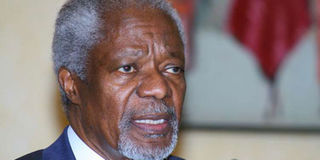Kofi Annan recalls his role in Kenya 2008 peace accord

Former United Nations Secretary General Dr Kofi Annan. PHOTO | FILE | NATION MEDIA GROUP.
In 2017, former UN Secretary-General Kofi Annan marked nine years since he brokered a peace deal between retired President Mwai Kibaki and former Prime Minister Raila Odinga that ended the post-election turmoil in 2008.
Dr Annan led the Panel of Eminent African Personalities convened by the African Union in the negotiations that ended the post-election violence following the disputed December 27, 2007 elections.
PEACE ACCORD
The peace accord was signed between retired Mr Kibaki of Party of National Unity and Mr Odinga of the Orange Democratic Movement.
The National Accord signed on February 28, 2008, at the height of the post poll chaos, saw the birth of the Grand Coalition Government led by the two leaders.
On Tuesday, exactly nine years since the signing of the peace deal, Dr Annan recalled his role in the talks.
INTENSIVE
“My role in mediating was amongst the most intensive and enduring of all my interventions,” Dr Annan tweeted on Tuesday.
He went on: “Several key elections in Africa have unfolded much more peacefully since then, but we have a long way still to go.”
Every African, Dr Annan said, must be able to trust in “our political institutions, in the supremacy of the rule of law and in the accountability of our leaders.”
Dr Annan led a team of eminent African personalities in the negotiations among them former Tanzanian President Benjamin Mkapa and former South Africa First Lady Graça Machel.
PEV VICTIMS
Meanwhile, victims of the 2007/2008 post-election violence have called on politicians to stop whipping public emotions in campaigns to avoid inciting Kenyans to violence.
The PEV victims on Tuesday said aspirants should tame their tongues and actions as citizens were already worried about sinking back into a chaos.
Gladys Muthoni Wandati, a victim from Nakuru who underwent multiple violations during the PEV of 2007/8, said the country is already deeply polarised along ethnic lines just like it happened in 2007.
INCITEMENT
“Today, as we commemorate the ninth anniversary of the National Dialogue and Reconciliation Accord, which was signed on 28th February 2008, we observe that the nation is perilously polarised along ethnic and political lines just as was the case around the 2007 General Election,” said Wachira Waheire, National Coordinator National Victims and Survivors Network.
Margaret Mbatia, another victim from Uasin Gishu, said: “Leaders are already inciting young people and driving them into alcoholism and drug abuse so that they can use them for their political battles. It is worrying that cases such as the ones witnessed in 2007 are now coming up again, and we are seeing those scenes we saw ahead of 2007 elections on our TV screens right now."
VOILATIONS
The two spoke during a consultative forum that discussed procedures to implement the restorative justice fund in Nairobi.
Ms Mbatia said Kenyans should be worried of such actions as the same preceded the 2007 PEV turmoil.
“Politicians would like us to forget the violations meted on us during periods like these. They have even said we should forget and move on, but then we cannot because they keep repeating this same conduct come every other election period, and more people keep being afflicted by their bad actions,” said Joseph Kung’u, another victim from Eldoret.
PARALYSED
“Yet”, added Mr Kung’u, “the campaigns are about how they’ll acquire the position of power or retain that power for themselves”.
Gregory Ngoche, a victim from Kisumu who is paralysed after being shot by police at his home in Kibos, said politicians need to look for ways of settling their political scores without involving their supporters.
“Kenyans, especially the youth, also need to learn by now that these political opponents are only thinking of how they’ll acquire the seat and not how they will elevate you. It is evident from the way they behave after they have acquired the position,” said Ngoche.
LETTER TO UHURU
The victims have written a letter to President Uhuru Kenyatta, asking him to act on the pledges he made in a March 26, 2015 in his State of the Nation Address.
Mr Kenyatta promised to fast-track the operationalisation of the Restorative Justice Fund.
The victims said they were wondering why the president, whose party enjoys majority of seats in Parliament, had failed to invoke the same leverage in pursuing the adoption and full implementation of the TJRC report that contains a roadmap to a more cohesive and stable nation that respects the rights of all.






